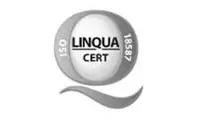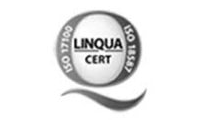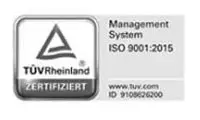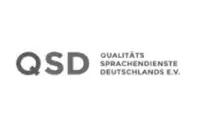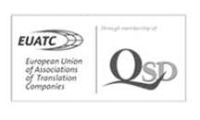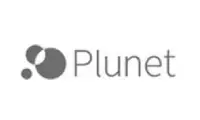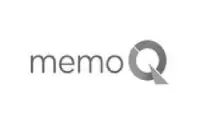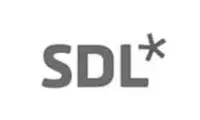
mpü – translation agency and language service provider
The requirements for the specialisation of “medical translation” are very high.
Achieving our goal for this area of expertise requires a high level of linguistic and technical skill on the part of our team.
Requirements that we meet!
- For your globally active company
- For quality and reliability in implementation
- For your success
- In 150 languages in all desired language combinations
- With several thousand technical translators and subject experts in medicine, pharmaceuticals and medical technology around the world.
The translation is prepared by a translator specialising in the respective subject area who is a native speaker of the target language.
Check: Revision of the finished translation and the target content by the translator. This self-revision is part of each technical translation.
Translation according to DIN EN 17100 requires the following process steps
- Technical translation incl. self-revision
- Revision (incl. creation of the final version)
- Quality assurance check
- Verification
Technical translation incl. self-revision
The translation is prepared by a translator specialising in the respective subject area who is a native speaker of the target language.
Check: Revision of the finished translation and the target content by the translator.
Revision incl. final version
Bilingual check: sentence-by-sentence revision of the translation and the target content against the source text by a second independent translator (reviewer) who is also an expert in the respective subject area and a native speaker of the target language.
The revision includes checking for
- Completeness
- Spelling
- Grammar
- Punctuation
- Understandability
- Terminology
Creation of the final version: The translator (or the reviser) prepares the final version taking into account the reviser’s suggested corrections.
Quality assurance check
Final quality control by project manager:
- Spelling
- Completeness
- Language variant rules (EN: UK-US, ES: EU-LAC, etc.)
- Numbers and units
- Product names (incl. registered symbols)
- Consistency within the text (based on repeating segments)
- Terminology consistency (against term base, if available)
Verification
Project manager verifies that all project specifications have been complied with.
Other than the linguistic transfer (translation), during localisation texts are adapted to geographical factors such as numbers, times, currencies, measurement units, product names. Specific cultural aspects of the design, images and colours also need to be taken into account.
Localisation is also performed in the case of local legal regulations such as for studies: Country-specific label check for investigational medicinal products.
- Back translation
- Comparison of the back translation with the source text
The back translation serves as an additional validation step in the workflow.
When it comes to ensuring quality, precision and accuracy, back translation including a subsequent comparison with the source text should be taken into consideration as a tool for evaluating quality.
The translated text is translated back into the original source language. This is then followed by a reconciliation of the back translation and the original source text. The reconciliation allows us to detect and eliminate translation errors and misinterpretations.
The back translation may help identify any uncertainties or sensitive details which might have been overlooked or misinterpreted in the translation. It also ensures that all intercultural questions are addressed and cleared up prior to the publication of the translation, thus confirming its conceptual and cultural suitability for the target group.
This translation option is best suited for:
- Documents for IRBs or ethics committees
- With transcreation, as confirmation of the correct message
- Press releases
If the text is particularly urgent, our global network of translators and reviewers means work can be carried out in all time zones to complete translations and revisions in just a few hours, overnight or at weekends.
Certificate
mpü delivers a translation certificate for every translation option which contains details of the language and subject experts involved, a precise description of the selected process and the title of the document and language directions.
This attests to the fact that a translation has been prepared by native-speaker translators qualified in the respective area of expertise to the best of their knowledge.
Authentication: Sworn and certified translations
The authentication confirms that the translation corresponds to the source text. It is issued by a translator certified by a District Court (Landgericht).
There are two options:
- The certified translator confirms that their own translation is complete and accurate.
- The certified translator confirms that another translator’s translation is complete and accurate. This option is available if the original translator is an expert in a specific subject area (e.g. medicine, chemistry etc.) but is not certified themselves.
Apostille
An apostille is a form of authentication used for documents in an international context. It is accepted for legal dealings between signatory states of the multilateral Hague Convention No. 12 Abolishing the Requirement for Legalization of Foreign Public Documents. The target country is to be stated in the apostille.
The apostille is a legal authentication that is issued in addition to an authentication already provided by a certified translator.
Voiceover, synchronisation and subtitling
To ensure that you strike the right note in all languages, we would be happy to help you to translate your audio and video projects in a wide range of areas such as
- Marketing: image films, advertising films, interviews, product presentations, telephone information services
- Education: podcasts, documentaries, recordings of conferences and congresses
- Training: training videos, tutorials, webinars
The steps involved in audiovisual translation:
- Transcription
If there is no written transcript for the words that are spoken or that appear on the screen, our native speaker translators will create the transcript taking into account your requirements and conventions (insertion or omission of filler words, formating, adjustment of the length, etc.)
- Translation of the transcript
Then our target language technical translators translate the transcript into the desired language(s).
During the translation there are certain criteria that need to be taken into account so the reader or listener can understand the translation easily, whether this is the length of the subtitles or the complexity of the spoken texts.
We recommend translation according to DIN EN ISO 17100 including revision by a second independent translator to achieve the best possible result.
We would be happy to send you the translations for approval before they are further processed to make sure everything is as you want it to be and excessive correction work can be avoided in advance.
The following options are available for integrating the translations we ultimately have into the multimedia content: Voiceover, synchronisation and subtitling.
Get in touch and we can discuss your desires and requirements directly and find the right process together.
In all desired language combinations.
Western, Central and Eastern Europe
- Albanian
- Armenian
- Belarusian
- Bosnian
- Bulgarian
- Danish
- German (Belgium, Germany, Luxembourg, Austria, Switzerland)
- English (Ireland, UK)
- Estonian
- Finnish
- Flemish
- French (Belgium, France, Luxembourg, Switzerland)
- Greek
- Icelandic
- Italian (Italy, Switzerland)
- Croatian
- Latvian
- Lithuanian
- Maltese
- Macedonian
- Dutch (Belgium, Netherlands)
- Norwegian
- Polish
- Portuguese
- Romanian
- Swedish (Finland, Sweden)
- Serbian
- Slovakian
- Slovenian
- Spanish
- Czech
- Turkish
- Hungarian
Asia, Middle East and CIS
- Arabic
- Bengali
- Burmese
- Chinese (traditional and simplified)
- Dari
- Farsi
- Gujarati
- Hebrew
- Hindi
- Indonesian
- Japanese
- Kazakh
- Korean
- Kurdish
- Malay
- Marathi
- Pashto
- Russian
- Sanskrit
- Tamil
- Thai
- Telugu
- Thai
- Ukrainian
- Urdu
- Uzbek
- Vietnamese
- Other languages on request
Africa
- Afrikaans
- Arabic
- Hausa
- Igbo
- Swahili
- Zulu
- Other languages on request
America
- English (USA and Canada)
- French (Canada)
- Portuguese (Brazil)
- Spanish (all Latin American countries)
Discover our language solutions.
Get in touch.

